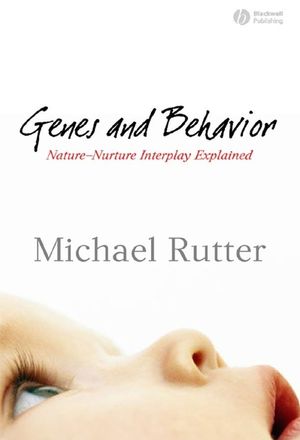Genes and Behavior: Nature-Nurture Interplay ExplainedISBN: 978-1-4051-1061-7
Paperback
292 pages
February 2006, Wiley-Blackwell
 This is a Print-on-Demand title. It will be printed specifically to fill your order. Please allow an additional 10-15 days delivery time. The book is not returnable.
|
||||||
"When I came to read this book I anticipated the critical integration of evidence by one of the most resourceful scientists of our era. I was not let down." (Journal of Children's Services, December 2007)
"The question of how genes and the environment interact should be an area of interest to all social and physical science; it should not remain solely the domain of geneticists. For anyone interested in developing a greater understanding of the mechanics of this interaction, this book would make an excellent choice." (Young Minds Magazine, July 2006)
"Michael Rutter, the United Kingdom's gift to world psychiatric excellence deals with this issue head-on in an amazingly readable and highly accurate book about genes and behaviour. ... This book is a gem." (Psychological Medicine, 2006)
"If you want an inspiring contribution to the debate in this highly topical area or research and also want to learn about the most up-to-date approaches to genetic research, then this is the book to choose." (Nature, 2006)
"Rutter offers a highly critical and extremely clear and well-written review of the current state of the nature/nurture argument as it relates to human behaviour and psychiatric illness. ... It is written in a way that should be easily accessible to the general reader as well as to the specialist. And, since its subject matter affects all of us, it should be read widely." (Times Higher Education Supplement)
"The author deftly deals with the extreme arguments of genetic and environmental evangelists. It is a lucid, balanced tour de force. Highly recommended." (Journal of Clinical Psychiatry)
"In this highly readable and intellectually honest book, the latest advances in molecular and behavior genetics are brought to bear on our knowledge of psychology and psychiatry. The end product is an eloquent exposition of “genetic realism” in the context of behavior, and will surely be of interest to all who are curious about the forces that give rise to human behavior, both normal and abnormal."–Charles A. Nelson III, Harvard Medical School
"Genes and Behavior: Nature–Nurture Interplay
Explained manages to be comprehensive, lucid, and clear,
without oversimplifying what is an inherently complex subject. It
enables a clinician to understand the fundamentals of genetics as
they apply to medicine and a geneticist to understand the
environmental determinants of the phenotype. What makes it entirely
remarkable is that it is comprehensible to generalists and yet has
much to teach specialists."
–Leon Eisenberg, Harvard Medical School
"No one but Michael Rutter could have written this remarkable,
compelling book. At last we have a clear and balanced treatment of
the role genes play in the variations among individuals in
behavioral traits and psychosocial pathologies. Rutter rescues the
reader from the excesses of both the "evangelical" geneticists and
the environmental extremists. He draws on his vast knowledge of the
pertinent theories and empirical work, and takes the reader beyond
the limited scope of statistical twin and adoption studies into the
recent work of molecular geneticists, illuminating some of the
complex biological processes that govern the ways in which genetic
factors can work or fail to work in influencing behavioral
outcomes, and how their effects can be modified by experience.
Rutter presents a carefully reasoned case for co-action of genetic
and environmental factors at all stages of development. A must-read
for anyone seriously interested in nature/nurture issues."
–Eleanor E. Maccoby, Stanford Center on
Adolescence



